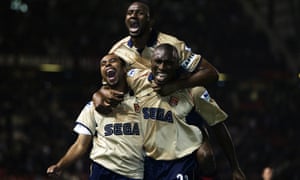 |
| Ashley Cole, Patrick Vieira and Sol Campbell celebrate Arsenal’s Premier League title with a 1-0 victory over Manchester United in May 2002, the 12th league win of their record run. Photograph: Alex Livesey/Getty Images |
Chelsea’s
defeat at White Hart Lane means they have failed to equal Arsenal’s
English top-flight record winning run of 14 consecutive matches, falling
one short at 13, although they did match the record for successive wins
in a single season.
Chelsea’s run began following their 3-0 defeat at Arsenal on 24 September, after which they won 2-0 at Hull City and carried on winning right through October, November and December.
Arsenal supporters will claim their run was of greater significance,
even if it spanned two seasons, given that the 13 successive victories
at the end of the 2001-02 campaign carried Arsène Wenger’s side to the
title. They also fitted in winning the FA Cup, beating Chelsea 2-0 in the final in the Cardiff to complete Wenger’s second Double in five seasons.
Such a feat had hardly looked likely when Arsenal
headed to Everton on 10 February sitting in fourth place in the table,
although only three points behind leaders Manchester United and with a
game in hand. Sylvain Wiltord’s second-half goal was enough to ensure
victory at Goodison Park, though, and the historic run had unwittingly
begun.
After Fulham were dispatched 4-1 at Highbury, Dennis Bergkamp’s goal
of the season at St James’ Park was the catalyst for a 2-0 win against
Newcastle United. A fourth win arrived when Robert Pires hit the only
goal of the game against Derby and Arsenal were up to second and had
closed the gap to Sir Alex Ferguson’s United to a single point, still
having played a game less.
Pires, who had struggled in his first season in England but was
having an influential campaign that was to end with him being crowned
the Football Writers’ Player of the Year, then scored with an audacious
lob over Peter Schmeichel to give Arsenal a 2-1 victory at Villa Park
and a fifth successive win. That was to be the Frenchman’s last input,
however, as what initially looked an innocuous injury in an FA Cup
sixth-round replay win over Newcastle at Highbury was later diagnosed as
a torn cruciate knee ligament, ruling him out of the rest of the season
and the World Cup in South Korea and Japan.
With
Manchester United enduring a shock home defeat by Middlesbrough,
Arsenal then swatted aside both Sunderland and Charlton 3-0 over the
Easter weekend to make it seven wins on the spin and they were top,
taking a first place briefly occupied by Liverpool.
Arguably the closest the run came to ending was against Spurs at
Highbury in early April. Leading 1-0 through Freddie Ljungberg’s goal -
the Swede with the red streak in his hair was to have a profound impact
on the remainder of the campaign – Highbury was silenced when referee
Mark Halsey awarded Spurs a penalty after David Seaman and Gus Poyet
collided in the area and Teddy Sheringham converted from the spot. Five
minutes later Halsey redressed the balance by awarding Arsenal an
equally debatable penalty for a tangle between Dean Richards and Thierry
Henry, and with Henry not on the pitch to resume penalty-taking duties
it was left to Cameroonian Lauren to nervelessly roll it past Kasey
Keller to secure an eighth successive win.
After that scare Arsenal were relentless, reeling off three
successive 2-0 wins against Ipswich and West Ham United at Highbury and
then at Bolton, featuring four goals from the irrepressible Ljungberg.
After a break to see off Chelsea 2-0 in the FA Cup final - with
second-half strikes from Ray Parlour and Ljungberg again – a 12th
successive league win, 1-0 at Manchester United courtesy of Wiltord’s
goal, sealed the Double at Old Trafford. It also meant Arsenal had
surpassed the previous best top-flight winning run of 11, set by
Tottenham’s 1960-61 Double-winners.
The title was secured but the winning run went on: Everton were
beaten 4-3 on the final day of the 2001-02 season and then Birmingham
2-0 on the first day of 2002‑03 before West Ham held Arsenal 2-2 at
Upton Park on 24 August to halt the run at 14 games spanning six months.
Arsenal did not actually lose a league game again until a teenage
Wayne Rooney’s brilliant strike saw them defeated 2-1 at Goodison Park
on 19 October 2002, 10 months and 30 games since their previous league
defeat. At the end of that season they embarked on what would be another
record run, the 49-game streak lasting from May 2003 to October 2004
and encompassing the entire ‘Invincibles’ season of 2003-04.
No comments:
Post a Comment
PLEASE BE POLITE